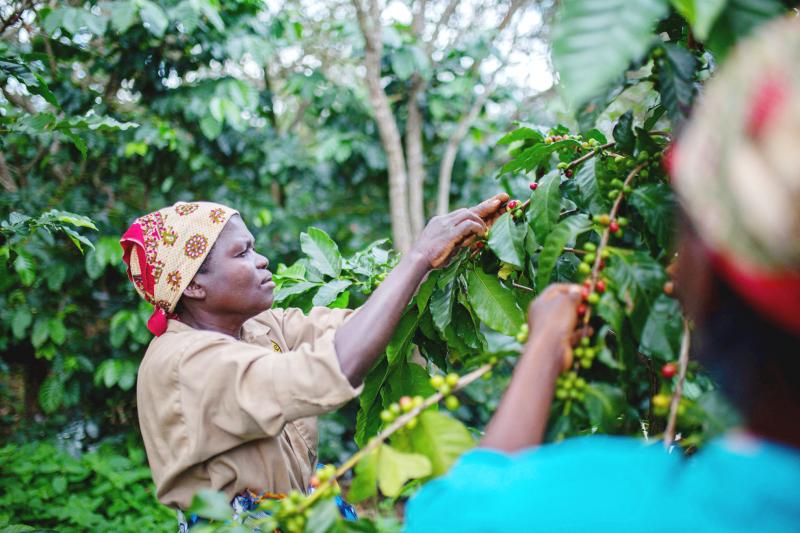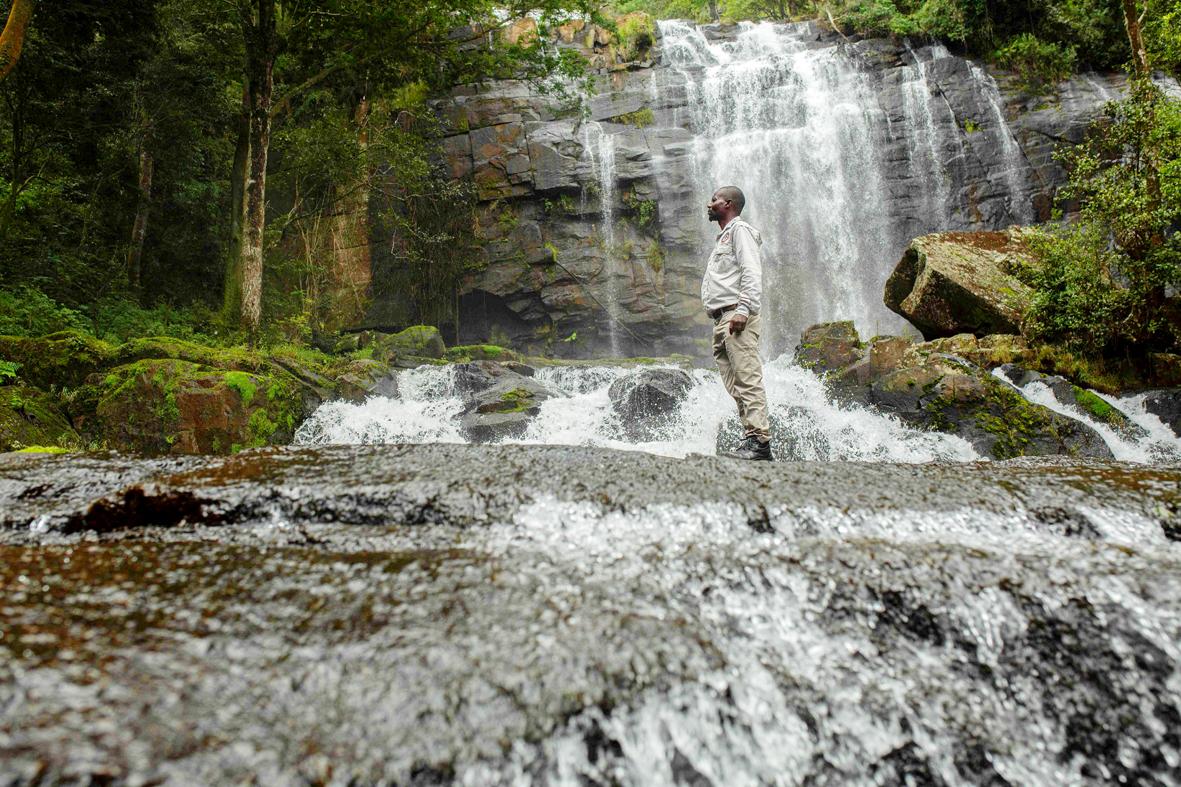From a distance, Mount Gorongosa looks pockmarked.
The slopes of this Mozambican landmark were once covered with verdant rain forest. Now, they are scarred by deep holes — the result of clearcutting that exposed the soil and parched it, leaving only shrubs and grasses.
But in recent years, the forest has been growing back, thanks to a previously foreign crop: coffee.

Photo: AFP
As Juliasse Samuel Sabao walks through the plantation, at an altitude of some 1,000 meters, he points out the obvious progress.
One side of the track resembles a desert. On the other, a dense forest shelters carefully placed coffee plants.
“Before, this was completely empty. Today, you see the result. Coffee needs shade to grow. So, for every coffee plant, we plant a tree as well,” he said.

Photo: AFP
Sabao, who works for Gorongosa National Park, fled to Zimbabwe to escape Mozambique’s civil war. There, he discovered coffee culture.
He brought that knowledge back with him to help restore the mountain, which was largely cut off from the world for decades.
LEGACY OF WAR
Mozambique fought a bloody war for freedom from Portugal, but after independence in 1975, a civil war ravaged the country until 1992.
A smaller conflict later erupted in 2013, ending with a peace treaty in 2019.
During the conflicts, Renamo rebels who used the mountain range as a war-time base and stronghold, exploited the park’s natural resources to the brink of environmental collapse.
Pedro Muagara, a trained agronomist and the park’s director, had planted a few seedlings, until the conflict shattered his coffee dreams.
As the war dragged into its final years, besieged rebels camped on the mountain slopes with their families. They cleared the forest to grow crops to survive. Now he’s back, teaching communities new ways of farming.
“These people depended on subsistence farming, because they can’t afford machinery like tractors. That turned them into agricultural nomads,” he said.
“So, they’d clear a few areas, and then deforestation stripped nutrients from the soil. The land got depleted, and when that happened, they’d go clear another patch.”
The peace treaty didn’t solve the problems of communities on the mountain.
“They didn’t have the training or the means to transition from being itinerant farming to conservation farming,” Muagara said. “We had to explain to them that when they lose a tree, they lose their livelihood with it.”
SAVING TREES
Coffee plants take several years to become productive, so the program also includes food crops so the communities can still support themselves.
The World Bank says Gorongosa now has some 300,000 coffee plants as well as 400,000 cashew trees, 400 beehives and 300 new jobs.
Gorongosa coffee is exported around the world, with profits ploughed back into the plantation.
The forest’s revival reflects Gorongosa’s larger rebirth, since a 20-year partnership was formed in 2008 between Mozambique and the foundation of American philanthropist Greg Carr.
The World Bank has praised the partnership as a model, which has benefited some 200,000 people in the area.
The program also aligns with the government’s goal of improving agriculture and moving beyond exports of raw commodities, said Celso Correia, Agriculture and Rural Development minister.
“One of the biggest challenges in the agriculture sector is the lack of mechanization, and the need for technology transfers,” he said. “The priority is to mobilize resources, but also to improve mobility, developing infrastructure and transportation, so that we can improve the value chain.”
With the war in Ukraine, “commodity price inflation is also affecting Mozambique. We need to alleviate this pressure... increase production, (and) be self-sufficient,” he said.
“We can’t depend on international projects.”

June 23 to June 29 After capturing the walled city of Hsinchu on June 22, 1895, the Japanese hoped to quickly push south and seize control of Taiwan’s entire west coast — but their advance was stalled for more than a month. Not only did local Hakka fighters continue to cause them headaches, resistance forces even attempted to retake the city three times. “We had planned to occupy Anping (Tainan) and Takao (Kaohsiung) as soon as possible, but ever since we took Hsinchu, nearby bandits proclaiming to be ‘righteous people’ (義民) have been destroying train tracks and electrical cables, and gathering in villages

Dr. Y. Tony Yang, Associate Dean of Health Policy and Population Science at George Washington University, argued last week in a piece for the Taipei Times about former president Ma Ying-jeou (馬英九) leading a student delegation to the People’s Republic of China (PRC) that, “The real question is not whether Ma’s visit helps or hurts Taiwan — it is why Taiwan lacks a sophisticated, multi-track approach to one of the most complex geopolitical relationships in the world” (“Ma’s Visit, DPP’s Blind Spot,” June 18, page 8). Yang contends that the Democratic Progressive Party (DPP) has a blind spot: “By treating any

Swooping low over the banks of a Nile River tributary, an aid flight run by retired American military officers released a stream of food-stuffed sacks over a town emptied by fighting in South Sudan, a country wracked by conflict. Last week’s air drop was the latest in a controversial development — private contracting firms led by former US intelligence officers and military veterans delivering aid to some of the world’s deadliest conflict zones, in operations organized with governments that are combatants in the conflicts. The moves are roiling the global aid community, which warns of a more militarized, politicized and profit-seeking trend

This year will go down in the history books. Taiwan faces enormous turmoil and uncertainty in the coming months. Which political parties are in a good position to handle big changes? All of the main parties are beset with challenges. Taking stock, this column examined the Taiwan People’s Party (TPP) (“Huang Kuo-chang’s choking the life out of the TPP,” May 28, page 12), the Democratic Progressive Party (DPP) (“Challenges amid choppy waters for the DPP,” June 14, page 12) and the Chinese Nationalist Party (KMT) (“KMT struggles to seize opportunities as ‘interesting times’ loom,” June 20, page 11). Times like these can